|
|
|
Sort Order |
|
|
|
Items / Page
|
|
|
|
|
|
|
| Srl | Item |
| 1 |
ID:
187533
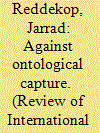

|
|
|
|
|
| Summary/Abstract |
This article offers an experiment in theorising within or across a ‘space’ of ontological disagreement – which, as numerous authors have contended, characterises much that is at stake in relations between states and Indigenous peoples in the Americas. Such ontological disagreements, I argue, contain radical potential for disrupting globally dominant and anthropocentric patterns of thinking and relating, and for generating alternatives. I substantiate this point with reference to the relational ontologies informing different Indigenous ways of analysing and practicing existence. Drawing on Amazonian Kichwa thinking and Anishinaabe accounts of treaties, I show how these relational ontologies recast the problem of how it is possible to relate with difference, in such a way as to fold an inter-human ‘international’ into a continuum of relations that include human-nonhuman ones. Distinct normative horizons emerge. I argue that non-Indigenous people can draw a range of provocations here concerning our constitution as selves and the political space in which we understand ourselves to possibly participate. I also claim, however, that this more transformative potential is predominantly squandered through processes of what I call ontological capture, which troublingly re-entrench dominant construals of reality and forestall a more radical questioning and re-patterning of accompanying lifeways.
|
|
|
|
|
|
|
|
|
|
|
|
|
|
|
|
| 2 |
ID:
150568
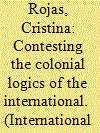

|
|
|
|
|
| Summary/Abstract |
In this article, I offer a critical historical analysis of modernity, identifying tensions between logics of modernity that rely on premises of colonial and capitalist modernity as a universalizing project, and those that instead propose an alternative decolonial project. As part of the latter, I outline the contours of an emergent and distinct political project premised on deep relational ontologies between humans, and humans and nature. I develop the analysis in three interrelated parts. I begin by critically reconstructing the justifications for the universal project of colonial and capitalist modernity and the “method of rule” through which it has been realized. In part two, drawing on case examples primarily from Latin America, I identify and discuss the opening toward an alternative political project of negotiating between worlds with the potential to challenge fundamentally the logics of universal modernity. In part three, I conclude with some critical insights into the colonial logics of modernity, emphasizing that they have always been contested. I argue that, given the inequalities and crises of modernity, there is an urgent need to reflect critically on the concrete possibilities afforded through an alternative political project, at the core of which are struggles for social justice without nature–culture distinctions. Ultimately, this project fractures the international and, instead, aspires toward the pluriverse.
|
|
|
|
|
|
|
|
|
|
|
|
|
|
|
|
| 3 |
ID:
187534
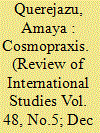

|
|
|
|
|
| Summary/Abstract |
Bringing ontological questions back into IR has been key to opening discussions about plurality and difference in terms of the coexistence of related and plural worlds and realities, for example through notions such as relationality and pluriversality. The problem is that in trying to develop relational approaches as an alternative to the ‘Western/modern’ – atomistic – ontology, relationality, relations, and their meanings can become fixed, translating them into ‘things’. The article maintains that cosmopraxis – as a complex pluriversal, multidimensional set of experiences – not only illustrates how relations relate without fixing their meaning, but also provides us with relevant insights to contribute to think of a pluriversal and more plural IR.
|
|
|
|
|
|
|
|
|
|
|
|
|
|
|
|
| 4 |
ID:
192309
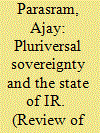

|
|
|
|
|
| Summary/Abstract |
IR proceeds on a Eurocentric ontological assumption that sovereignty has universal validity today. How can IR be decolonised, when in spite of countless examples of the enactment of ‘sovereignty otherwise’, the discipline remains unconcerned with the fact that the logic of sovereignty remains uni-versal. The question is as much political as it is intellectual, because as a discipline, we have allowed the inertia of our professional rhythms to marginalise pluri-versal sovereignty, or the organisation of sovereignty along different ontological starting points. I argue IR must abandon its disciplinary love affair with uni-versal sovereignty. The tendency to ‘bring in’ new perspectives by inserting them into an already ontologically constituted set of assumptions works to protect IR’s Eurocentricity, which makes disciplinary decolonisation untenable. I propose that as a starting point, IR needs to be more mature about recognising the decolonisations that are happening under our very feet if we are to stand a chance at disciplinary level decolonisation. As an illustrative example, I explore an ongoing collision of settler-colonial and Mi’kmaw sovereignty through the issue of lobster fisheries in Mi’kma’ki, or Nova Scotia as the territory is known to Canadians.
|
|
|
|
|
|
|
|
|
|
|
|
|
|
|
|
| 5 |
ID:
187531


|
|
|
|
|
| Summary/Abstract |
There is a multifaceted relational revolution afoot in International Relations (IR) and in the social sciences more widely. This article suggests, via engagement with varied forms of relational thought and practice in IR, but in particular via engagement with ‘relational cosmology’ associated with the ‘natural’ as well as the ‘social’ sciences, that there are important reasons for relational thought and practice in IR and around it to be more attentive to dialogues on relationality across natural and social sciences. If relational thought in IR has challenged the colonial and bifurcated ontologies of the field, relational cosmology too assists in shifting ‘modern’ understandings of science and the cosmos by facilitating engagement with situated knowledges and deep-going relationalities across ‘nature’ and ‘society’, ‘human’ and ‘non-human’ communities. Relational cosmology may be productive in joining, and perhaps even in facilitating, conversations across multiple relationalities emerging from different parts of the world and in different fields of inquiry, and yet – reflecting its relational and pluriversal orientations – it is not proposed here as a new ‘meta-‘ or ‘grand-’ narrative for relational theorising or IR.
|
|
|
|
|
|
|
|
|
|
|
|
|
|
|
|
| 6 |
ID:
153665
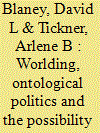

|
|
|
|
|
| Summary/Abstract |
This article argues that attention to representational practices and epistemology, however important for expanding the boundaries of International Relations as a field of study, has been insufficient for dealing with difference in world politics, where ontological conflicts are also at play. We suggest that IR, as a latecomer to the ‘ontological turn’, has yet to engage systematically with ‘singular world’ logics introduced by colonial modernity and their effacement of alternative worlds. In addition to exploring how even critical scholars concerned with the ‘othering’ and ‘worlding’ of difference sidestep issues of ontology, we critique the ontological violence performed by norms constructivism and the only limited openings offered by the Global IR project. Drawing on literatures from science and technology studies, anthropology, political ecology, standpoint feminism and decolonial thought, we examine the potentials of a politics of ontology for unmaking the colonial universe, cultivating the pluriverse, and crafting a decolonial science. The article ends with an idea of what this might mean for International Relations.
|
|
|
|
|
|
|
|
|
|
|
|
|
|
|
|
|
|
|
|
|